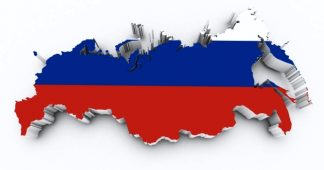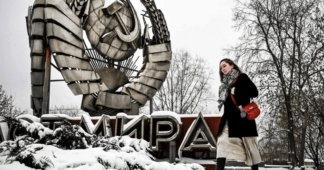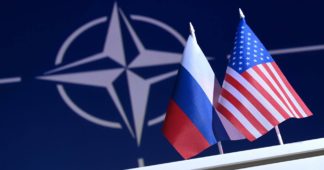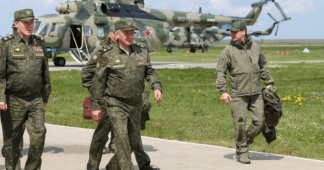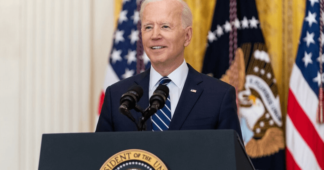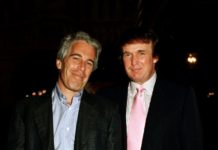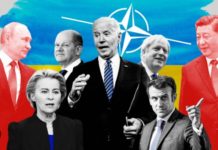Posted on
We need to constantly remind ourselves about the US media. During the Cold War, there was the saying that the difference between the New York Times and the Soviet Pravda was that Pravda readers knew they were being lied to. Unfortunately, current coverage by the US media about the movement of Russian troops demonstrates the applicability of that saying today.
Lies by Omission
For example, the US public is continually being told that the movement of a large number of Russian troops is a major crisis-inducing provocation of the US and NATO over Ukraine. There is much speculation about whether or not Russia will attack Ukraine and how the US and NATO should react to an attack. This coverage portrays Russia as the initiator of this situation and that the US and NATO are being forced to react. Unsurprisingly, the US media fails to remind the public about recent history that provides vital context for current events.
Promise and Betrayal
After the fall of the Berlin Wall there were negotiations about the reunification of Germany. During these negotiations, the US Secretary of State James Baker and West German officials promised that NATO would not expand eastward if the Soviets allowed Germany to be reunited. This promise was crucial for the Soviets given previous devastating invasions by Western European nations. For example, during WWII, estimates are that the Soviet Union lost over 26 million people, about 13% of its 1939 population. The Soviet Union was thus understandably concerned about a possibly hostile military group coming closer to its border.
In 1996, George Kennan, architect of the U.S. containment policy towards the Soviet Union, warned that NATO’s expansion into former Soviet territories would be a “strategic blunder of potentially epic proportions.” In 1998, Thomas Friedman solicited Kennan’s reaction to the Senate’s ratification of NATO’s eastward expansion. Kennan said: ”I think it is the beginning of a new cold war. I think the Russians will gradually react quite adversely and it will affect their policies. I think it is a tragic mistake. There was no reason for this whatsoever. No one was threatening anybody else.”
Despite Kennan’s warning, the Clinton administration broke the US promise and expanded NATO towards the Russian border. The following Bush and Obama administrations both continued the expansion and betrayal. Kennan was clearly correct and the NATO expansion has provoked an unnecessary crisis.
Cuba and Ukraine
Russia has strongly opposed further expansion of NATO to Ukraine and Georgia, nations that share borders with it. NATO missiles could quickly reach Moscow allowing little time for Russia to react. However, the US and NATO, blinded by arrogance and lacking any real statesmen, continue to dismiss Russia’s existential concerns.
Just as the US went to the brink of nuclear war over Soviet missiles in Cuba, Russian President Putin has drawn a red line over the entry of Ukraine and Georgia into NATO. Just as the US said that Cuba couldn’t have Soviet missiles positioned there, Russia is saying that Ukraine and Georgia can’t join NATO nor have US missiles positioned there.
US-supported coup and illegitimate government
The Western media has also downplayed the 2014 US-supported coup of the democratically elected Ukrainian President Viktor Yanukovych. The US wanted a leader of Ukraine to be someone who would want to join NATO. A mostly nonviolent protest of Ukrainians who wanted to join the EU began after Yanukovych rejected a bad EU economic aid offer in favor of a much better deal from Russia.
Eventually, after a violent government response to months of protests, a compromise between the government and the political opposition was negotiated by foreign ministers from Poland, France and Germany. Despite this agreement, violence and intimidation by the far-right immediately resumed and quickly led to Yanukovych’s departure. George Friedman, CEO of Stratfor, a US firm known as the ‘Shadow CIA’, said: “It really was the most blatant coup in history.”
Kosovo and Crimea
After the coup and the installation of an illegitimate government, Russia annexed Crimea and supported people in eastern Ukraine who rejected the Ukrainian government. The US-led West reacted quite strongly, particularly against the annexation of Crimea. However, Russia pointed out how the West supported the secession of Kosovo from Serbia.
According to Matthew Parish, a noted international lawyer based in Geneva, if nations cannot reach agreement on the right of minorities to secede and the emergence of new states, “then the difference between Kosovo and Crimea is precisely nothing, save one of political expediency; and the color of that lens depends upon which direction one may be looking through it. Viewed from the west, Kosovo is most expedient whereas Crimea is not. When one gazes through the eastern corner of the same lens, reflections may be reversed.”
Russian troop deployment and US-led NATO war games
US and Western stenographers posing as an independent media portrayed the positioning of a large number of Russian forces on its border with Ukraine as a huge provocation. It is unsurprising that these stenographers didn’t hype the numerous and large US/NATO war games in the Baltic and Black Sea areas as a provocation to Russia. Can you imagine the US reaction if a hostile military force were to hold war games near US borders?
Minsk II Protocol
An agreement was reached in February 2015 by the leaders of France, Germany, Russia and Ukraine that could resolve the crisis. The Minsk II Protocol was approved unanimously by the UN Security Council. Samantha Power, then US ambassador to the UN, said: “The consensus here, and in the international community, remains that Minsk’s implementation is the only way out of this deadly conflict.”
Instead of conducting war games and sending weapons to Ukraine, why not apply pressure on Ukraine to implement this agreement. Given what Samantha Power said, this seems to be the best way to avoid a war where there are no winners.
Ron Forthofer is a retired professor of biostatistics, having taught at the University of Texas School of Public Health in Houston. Since his retirement in 1991, he has been an activist for peace and social justice. He ran for Congress and for governor of Colorado for the Green Party.
Published at original.antiwar.com
We remind our readers that publication of articles on our site does not mean that we agree with what is written. Our policy is to publish anything which we consider of interest, so as to assist our readers in forming their opinions. Sometimes we even publish articles with which we totally disagree, since we believe it is important for our readers to be informed on as wide a spectrum of views as possible.
